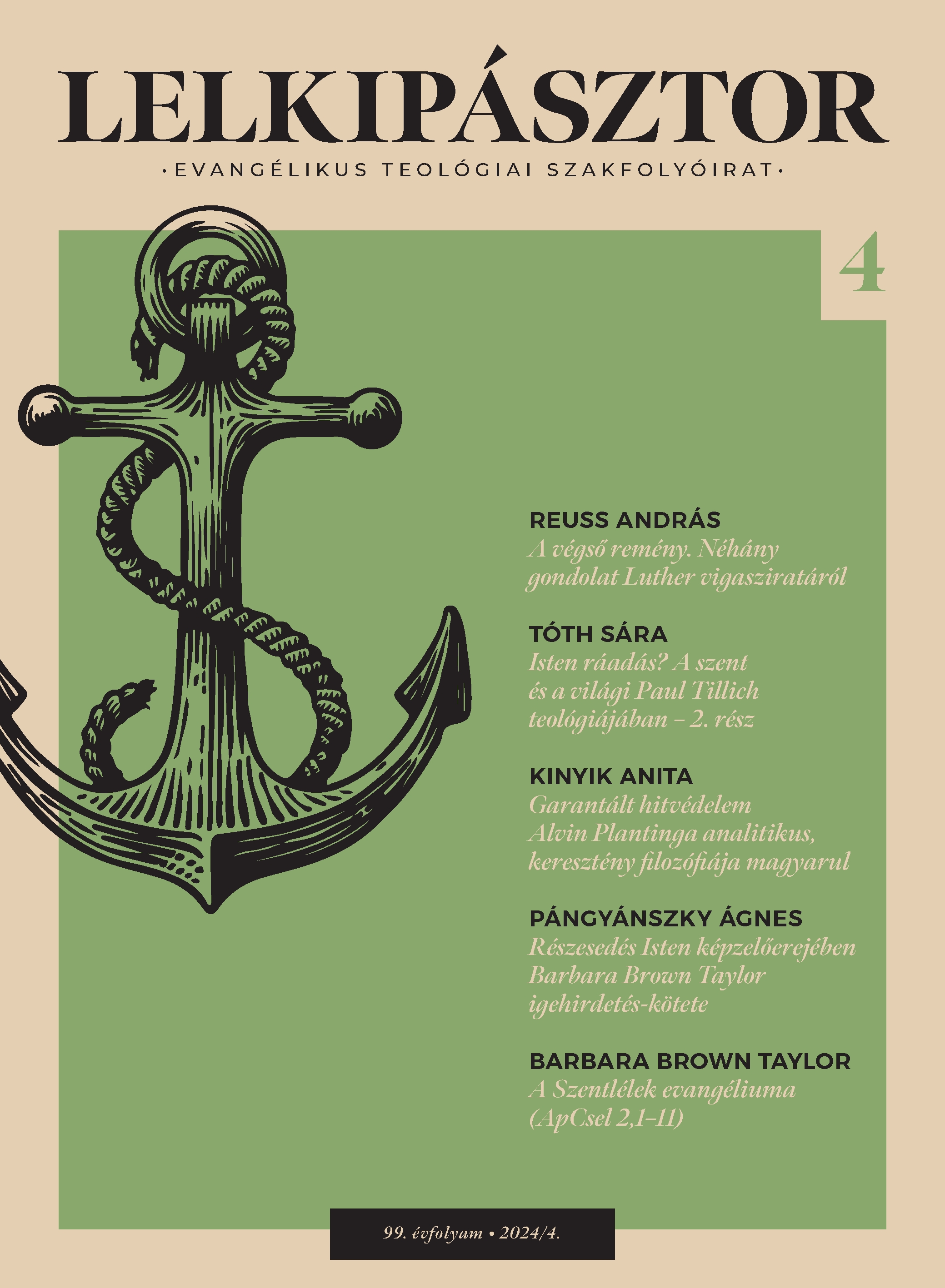Is God an Addition?
The Holy and the Secular in Paul Tillich’s Theology – Part Two
Abstract
The contemporary relationship between society, culture, and religion is best characterized as postsecular, marking an era in which the categories of religious and secular can no longer be described in terms of mutual exclusion. However, church discourse in Hungary remains mostly entrenched in dualistic approaches which sharply separate the holy and the secular. These tendencies, particularly evident in Protestant spirituality, often go hand in hand with a rigorously critical stance towards the secular world. This paper aims to explore Paul Tillich’s theology as a potential foundation for a Protestant sacramental vision, which is based upon the dialectics of participation and transcendence and emphasizes God’s manifestation in all created things on the one hand, but also God’s infinite transcendence on the other. According to Tillich, the ’unreconciled duality’ of the holy and the secular, religion and culture is the consequence of sin, and he envisions their eschatological unity in terms of a mutual interpenetration of the religious and the cultural/secular which he calls theonomy. The author proposes that this theonomical intersection makes it possible for the church to have a non-aggressive presence in the world.
References
Barth, Karl 1933. Epistle to the Romans. Ford. Edwyn C. Hoskyns. Oxford University Press, Oxford.
Bergman, Lucy 2004. Defining Spirituality. Multiple Uses and Murky Meanings of an Incredibly Popular Term. Guest Editorial. The Journal of Pastoral Care & Counseling, LVIII. évf. 3. sz. 157–167. o. https://doi.org/10.1177/154230500405800301
Béres Tamás 2002. Metafizika és hermeneutika között. A mítosz értelmezése Paul Tillichnél. PhD-disszertáció. Evangélikus Hittudományi Egyetem, Budapest.
Boersma, Hans 2011. Heavenly Participation. The Weaving of a Sacramental Tapestry. Eerdman’s, Grand Rapids.
Blondeau, Alexander T. 2015. Prayer Does Not Work. Paul Tillich and Centering Prayer. Word & World, XXXV. évf. 1. sz.
Bonhoeffer, Dietrich 1999. Börtönlevelek. Ford. Boros Attila. Harmat Kiadó, Budapest.
Brown, Mackenzie D. 1965. Ultimate Concern. Tillich in Dialogue. Harper & Row, New York. Web: https://media.sabda.org/alkitab-2/Religion-Online.org%20Books/Brown%2C%20D.%20Mackenzie%20-%20Ultimate%20Concern%20-%20Tillich%20in%20Dialogue.pdf. (Letöltés: 2023. december 15.)
Cooke, Bernard 1994. Sacraments and Sacramentality. Twenty-Third Publications, New London.
Cooper, John W. 2006. Pantentheism. The Other God of the Philosophers. Baker Academic, Grand Rapids.
Eliade, Mircea 2019. A szent és a profán. Ford. Berényi Gábor – M. Nagy Miklós. Helikon Kiadó, Budapest.
Finlayson, R. A. 1982. Holiness, Holy, Saints. In: J. D. Douglas et al. (szerk.): New Bible Dictionary. InterVarsity Press, Leicester. 486–487. o.
Kodácsy-Simon Eszter 2009. Paul Tillich teológiájának jelentősége a természettudomány és a vallás kapcsolatában. PhD-disszertáció. Evangélikus Hittudományi Egyetem, Budapest.
Kodácsy-Simon Eszter 2010. Technikai társadalmunk spirituális helyzete. Szempontok a környezetvédelemhez Paul Tillich írásai alapján. Egyházfórum, XXV. évf. 1. sz. 8–13. o.
Kodácsy Tamás 2016. Paul Tillich tengerpartja, a végtelen és a vízimajmok. Teológiai Szemle, LIX. évf. 3. sz. 143–149. o.
McKelway, Alexander 1964. The Systematic Theology of Paul Tillich. A Review and Analysis. Lutterworth Press, London.
Meditz, Robert E. 2016. The Dialectic of the Holy. Paul Tillich’s Idea of Judaism within the History of Religion. De Gruyter, Berlin–Boston. https://doi.org/10.1515/9783110432572
Otto, Rudolf 1997. A szent. Az isteni eszméjében rejlő irracionális és viszonya a racionálishoz. Ford. Bendl Júlia. Osiris, Budapest.
Reimer, James 2004. Tillich’s Christology in the Light of Chalcedon. In: uő: Paul Tillich. Theologian of Nature, Culture and Politics. Lit Verlag, Münster. 189–219.
Ricoeur, Paul – Lacocque, André 2003. Bibliai gondolkodás. Ford. Enyedi Jenő. Európa Kiadó, Budapest.
Ross, Robert R. N. T. 1975. The Non-Existence of God. Tillich, Aquinas, and the Pseudo-Dionysius. The Harvard Theological Review, LXVIII. évf. 2. sz. 141–166. o. https://doi.org/10.1017/S0017816000017107
Taylor, Charles 2007. A Secular Age. The Belknap Press of Harvard University, Cambridge–London.
Tillich, Paul 1948. The Protestant Era. Ford. James Luther Adams. The University of Chicago Press, Chicago.
Tillich, Paul 1953. The Shaking of the Foundations. Charles Scribner’s Sons, New York.
Tillich, Paul 1955. Biblical Religion and the Search for Ultimate Reality. University of Chicago Press, Chicago.
Tillich, Paul 1957. Dynamics of Faith. Harper and Brothers, New York.
Tillich, Paul 1959. Theology of Culture. Oxford University Press, Oxford–London–Glasgow.
Tillich, Paul 1973. The Boundaries of Our Being. A Collection of His Sermons with His Autobiographical Sketch. Collins, London–Glasgow.
Tillich, Paul 1999. The Essential Tillich. An Anthology of the Writings of Paul Tillich. Szerk. F. Forrester Church. University of Chicago Press, Chicago.
Tillich, Paul 2000. Rendszeres teológia. Ford. Szabó István. Osiris, Budapest.
Tóth Sára 2020. „A csoda helyszíne itt van közöttünk”. A hétköznapi, a rendkívüli és a szent a protestáns spiritualitásban. Sárospataki Füzetek, XXIV. évf. 4. sz. 65–84. o.
Tóth Sára 2022. A protestantizmus erősségei és gyengeségei. A protestáns princípium és a szakramentális szemlélet dialektikája Paul Tillich teológiájában. Sárospataki Füzetek, XXVI. évf. 2. sz. 27–47. o.
Westphal, Merold 1972. Hegel, Tillich, and the Secular. The Journal of Religion, LII. évf. 3. sz. 223–239. o. https://doi.org/10.1086/486299
Wirzba, Norman 2021. This Sacred Life. Humanity’s Place in a Wounded World. Cambridge University Press, Cambridge. https://doi.org/10.1017/9781009026185
Zimmermann, Jens 2012. Incarnational Humanism. A Philosophy of Culture for the Church in the World. IVP, Westmont.

This work is licensed under a Creative Commons Attribution-NonCommercial-NoDerivatives 4.0 International License.




